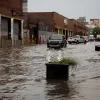As the hottest July weekend in 50 years swept through Greece, the island of Rhodes was consumed by an inferno, forcing the largest evacuation in the country’s history. The Greek fire department announced that 19,000 people, most of them tourists, had been relocated from villages and resorts as wildfires continued to spread uncontrollably on the Aegean island.
The blazes, fueled by high-speed winds and scorching temperatures, had already burned through pine forests, ancient ruins, and seaside villages, leaving a trail of destruction in their wake. Authorities acted quickly to ensure the safety of holidaymakers, moving thousands of people to temporary shelters across the island.
Tourists from hotels, schools, and gyms were ferried away from the fire zone by buses, trucks, and ships, with many being forced to leave behind valuable possessions. “It is the biggest operation to safely transport residents and tourists that has ever been carried out in our country,” said Ioannis Artopios, a Greek fire brigade spokesperson.
The Greek economy is heavily reliant on tourism, accounting for 25% of GDP and one in five jobs. The province of Rhodes, which has a population of over 100,000, welcomed around 2.5 million visitors last year. “It’s not about losing one or two weeks’ tourism; it’s about the impact on people’s lives,” said Juri Viesi, a hotel manager in Lardos, who had to evacuate over 400 guests from his hotel.

Firefighters from Germany, France, and Turkey joined Greek forces to battle the blaze, which continues to rage across the island. Paris and Ankara deployed water-dumping planes to support 49 fire trucks and 266 firefighters. The fire department reported that nine people had been admitted to health centers with respiratory problems, including a pregnant woman and a man who fell while being evacuated from a hotel.
The heatwave has also led to scores of blazes breaking out across Greece since the start of the extreme weather event, with new infernos reported on Evia and in the Peloponnese. Temperatures are expected to reach 45C (113F), making it difficult for firefighters to contain the flames.
The Greek government has set up a help desk at Rhodes international airport to assist tourists who have lost travel documents and arranged for donations of essentials such as mattresses and bedclothes. The country’s tourism minister, Olga Kefalogianni, has arrived on the island to oversee the relief efforts.
As the battle to contain the fires continues, authorities warn that the situation could take several days to resolve. Meanwhile, residents and tourists alike are left to grapple with the devastating aftermath of the inferno, which has destroyed entire neighborhoods, historic landmarks, and the island’s lush environment.

